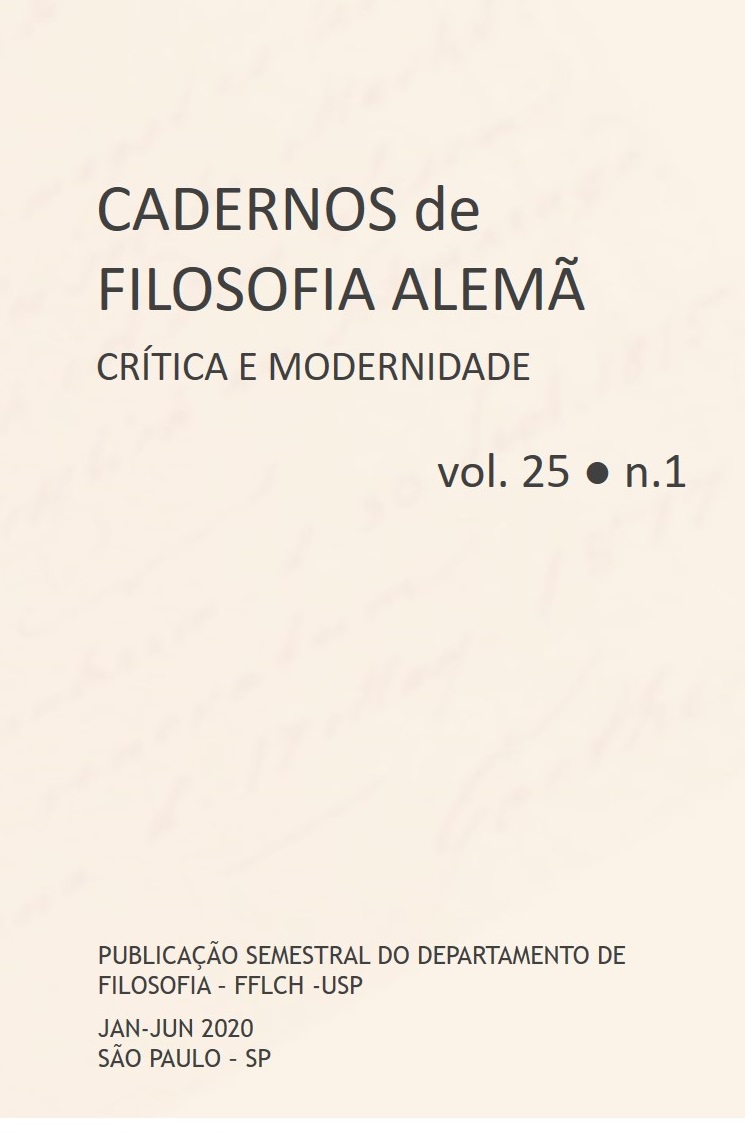Antiquity and Modernity in The Theory of the Novel by Georg Lukács
DOI:
https://doi.org/10.11606/issn.2318-9800.v25i1p13-29Keywords:
Lukács, Schlegel, novel, modernityAbstract
This article aims to illuminate the contrast between ancient and modern world formulated by Lukács in his work The Theory of the Novel. In order to do this, we turn back to a debate on Aesthetics from the XVIII century Germany, where the search for the fundamentals of modern art leads the debate to the construction of a contrast between an organic culture, filled with meaning, located in a mythical conception of Greece, and a splitted and fragmented world, which corresponds to the modern era. Friedrich Schlegel’s reflections on this subject are taken into special account here, since he treated this comparison in a historical way more so than his contemporaries. Following this, we point to the specificities of Lukács’ approach to the issue, which is more attuned to the historical and social basis of the process that culminated in the loss of a unitary meaning for life in modernity. We seek to show how this perception makes possible for Lukács to point out the limits of the romantic solutions to the splitted character of modernity.
Downloads
References
Armogathe, J.-R. (2001). «Un ancienne querelle». In: La Querelle des Anciens et des Modernes. Paris: Gallimard, pp. 801-849.
Benjamin, W. (1994). “O Narrador. Considerações sobre a obra de Nikolai Leskov”. In: Magia e técnica, arte e política - ensaios sobre literatura e história da cultura. São Paulo: Editora Brasiliense, pp. 197–221.
Bowie, A. (2003). “Introduction”. In: Aesthetics and subjectivity: from Kant to Nietzsche. Manchester, UK; New York: Manchester University Press, pp. 1–17.
D’Angelo, P. (1998). A estética do romantismo. Lisboa: Estampa.
Fumaroli, M. (2001). « Les abeilles et les araignées ». In: La Querelle des Anciens et des Modernes. Paris: Gallimard, pp. 7-220.
Habermas, J. (2002). “A consciência de tempo da modernidade e sua necessidade de autocertificação”. In: O discurso filosófico da modernidade. São Paulo: Martins Fontes, pp. 3-18.
Hegel, G. W. F. (1999). Curso de estética: o sistema das artes. São Paulo: EDUSP.
Lacoue-Labarthe, P.; Nancy, J-L. (1988). The literary absolute: the theory of literature in German romanticism. Albany: State University of New York Press.
Löwy, M. (1998). A Evolução Política de Lukács: 1909-1929. São Paulo: Cortez.
Lukács, G. (2000). A teoria do romance: um ensaio histórico-filosófico sobre as formas da grande épica. Tradução de José Marcos Mariani de Macedo. 2ª ed. São Paulo: Duas Cidades/Editora 34.
Lukács, G. (2010a). “On the romantic philosophy of life”. In: Soul and form. New York: Columbia University Press, pp. 59–72.
Lukács, G. (2010b). “The metaphysics of tragedy”. In: Soul and form. New York: Columbia University Press, pp. 175–198.
Nisbet, H. B. (1985). “Introduction”. In: German aesthetic and literary criticism. Cambridge: Cambridge University Press.
Pierucci, A. F. (2003) O desencantamento do mundo: todos os passos do conceito em Max Weber. São Paulo: Editora 34.
Reed, T. J.; Pasley, M. (1982). “The Goethezeit and its aftermath”. In: Germany, a companion to German studies. 2ª ed. New York; London: Methuen, pp. 499-558.
Schlegel, F. (1996). Sobre el estudio de la poesía griega. Torrejón de Ardoz: Akal.
Schmidt, R. L. (2011). “Arabesques and the Modern Novel: Friedrich Schlegel’s Interpretation of Don Quixote”. In: Forms of modernity: Dom Quixote and modern theories of the novel. Toronto: University of Toronto Press, pp. 47–81.
Silva, A. A. (2011). O interessante em Friedrich Schlegel. Trans/Form/Ação, 34, pp. 75–94. DOI: 10.1590/S0101-31732011000400006.
Süssekind, P. (2008). A Grécia de Winckelmann. Kriterion: Revista de Filosofia, 49(117), pp. 67–77. DOI: 10.1590/S0100-512X2008000100004
Szondi, P. (1975a). « Friedrich Schlegel et l’ironie romantique ». In: Poésie et poétique de l’idéalisme allemand. Paris: Les editions de Minuit.
Szondi, P. (1975b). « Le naïf est le sentimental ». In: Poésie et poétique de l’idéalisme allemand. Paris: Editions de Minuit.
Szondi, P. (1992). Poética y filosofía de la historia. Madrid: Visor.
Szondi, P. (2005). Poética y filosofía de la historia. v. 2. Madrid: Visor.
Winckelmann, J. J. (1954). Réflexions sur l’imitation des oeuvres grecques en peinture et en sculpture. Paris: Aubier.
Downloads
Published
Issue
Section
License
Information and conceptions on the texts are complete responsibility of the authors.
All the articles submitted before July 5th 2018 and those published after July 2021 are licensed under a CC BY-NC-ND license – except those published between the aforementioned dates, which are under the CC BY-NC-SA license. The permission for the translation of the material published under the license CC BY-NC-ND by third parts can be obtained with the consent of the author.
Open access policies - Diadorim
Rules applied before July 5th 2018:
Presenting a submission to our Editorial Board implies granting priority of publication for “Cadernos de filosofia alemã”, as well as transferring the copyright of texts (once published), which will be reproduced only with the manifest authorization of the editors. Authors keep the right to reuse the texts published in future editions of their work, without paying any fees to "Cadernos”. We will not grant the permission to re-edit or translate the texts for third parts without agreement of the author.
Funding data
-
Fundação de Amparo à Pesquisa do Estado de São Paulo
Grant numbers 12/11906-8


